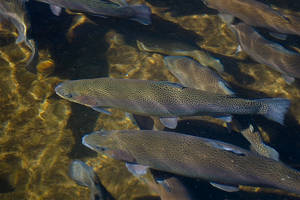Female Hormones Feminising Fish
Interview with
Karen - What we did was a whole lake experiment at the Experimental Lake Area in North Western Ontario. We took the oestrogen that's used in birth control pills and added it to the lake for several summers. The reason that we did this is because there was quite a bit of evidence coming out of the UK in the 1990s showing that male fish living downstream of municipal waste water outflows were becoming feminised. What I mean when I say feminised is that males were starting to produce egg proteins and in the more severe cases they were developing eggs. Several follow-up studies had actually started to link this feminisation in wild males to the presence of oestrogens that women excrete naturally or the synthetic oestrogen that women excrete when they're taking the birth control pill.
Chris - If you were already aware of that data what were you hoping to learn by doing it in a sealed lake?
Karen - Well, the big question that we want to answer with our study was 'so what does it mean for the fish populations to have feminised males?' Can these males still successfully reproduce or are we going to see them decline in their numbers?
Chris - When you did this what was the outcome of putting the oestrogen in the water?
Karen - Right away the males started to respond as we expected they would so we started to produce egg proteins and in one species of fish the male started to develop eggs after the first summer. These kinds of feminisation responses weren't surprising to us. In the second summer conditions we had quite a surprising response in that the fathead minnow, this is a very common and short-lived species in North America, had stopped reproducing. That led to a collapse in the fish population.
Chris - These fish don't live very long which is why if they stop reproducing their numbers are going to fall dramatically quite quick. What about if you look at fish that live much longer?
Karen - We looked at another longer-lived minnow species, the pearl dace. Their numbers did decline but they didn't decline quite as rapidly or as dramatically as the fathead minnows. That was telling us that yes, the characteristic of the fish, the life histories of the fish really affect how sensitive it is to these oestrogens. The ones that only reproduce once and then die off seem to be much more sensitive to oestrogens than the ones are longer-lived and reproduce several times over their life cycle. What we also saw in our study that was quite a surprise was the impact that the oestrogen had on the longest-lived fish: the lakeshrimp. It seems that the lakeshrimp weren't affected by the oestrogens directly but their numbers dropped in the third year of our study because they lost their food supply. When the fathead minnow population collapsed the lakeshrimp lost some of its prey and that, in turn, led to a drop in their numbers. This was pretty sobering to us because it showed that oestrogens can affect fish populations directly and indirectly through the food chain.
Chris - In other words by having a previously unrealised impact, by knocking down the populations and taking away the food supply your oestrogen is also affecting the fish in another way.
Karen - That's right. It's an indirect effect of this input of oestrogens into our environment that we didn't expect to see in our whole lake experiment.
 Chris - I guess the key question is, we know we're contamination water downstream of sewers and things but if we were to clean up our act tomorrow how long would the repercussions last for?
Chris - I guess the key question is, we know we're contamination water downstream of sewers and things but if we were to clean up our act tomorrow how long would the repercussions last for?
Karen - I think in our case we saw the fathead minnow population recover in three summers. It does suggest that they can recover quite quickly and certainly that's at the population level but when you look at things like the egg protein production or the development of eggs those kinds of responses in males would go away very rapidly after you removed the oestrogen from the system.
Chris - The other possibility is we just tell women they're not allowed to take the pill any more...
Karen - That's right. I've had that question before so does this mean we should ban the use of the birth control pill? The answer to that is no. We know 100 million women world-wide rely on the birth control pill and the answer really is in better ways of water treatment: making sure the waste water is treated at least with secondary treatment.









Comments
Add a comment